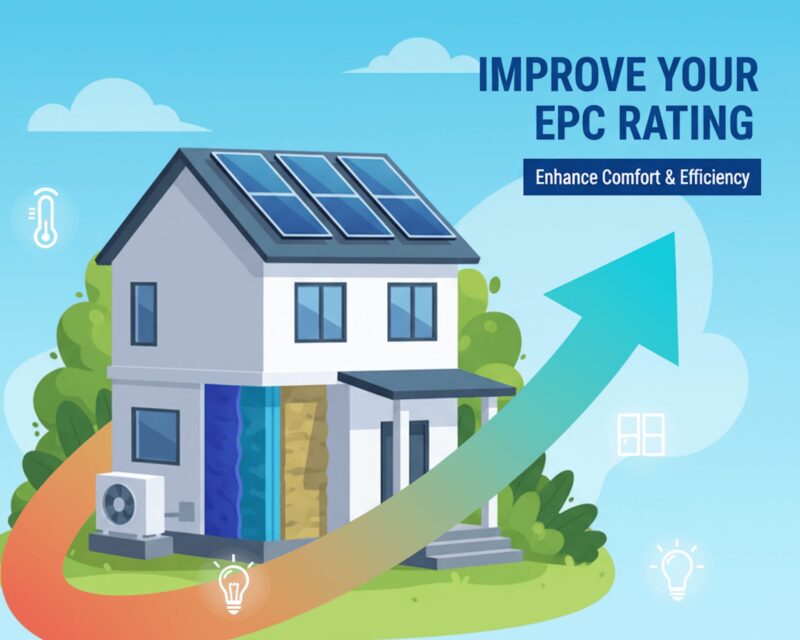Last Updated on 2 February 2026
Have your energy bills ever seemed too high? Have you thought about selling or renting your property? Both of these scenarios make your home’s energy performance, as reflected in its Energy Performance Certificate (EPC), very relevant.
Your home’s EPC impacts energy costs and also market value. The higher your EPC rating, the lower your energy costs. The higher your EPC rating, the more appealing your property is to buyers and renters on the low-carbon part of the spectrum. Many people ask how to improve epc rating to achieve these benefits effectively.
A good epc rating (such as C or above) is attractive to potential buyers and is considered above average in the property industry. The average EPC rating in the UK is D, so property owners should aim for a good epc rating to stand out. Learning how to get a good epc rating is the first step toward a more sustainable home.
The responsibilities of the property owner and the property industry include taking steps to improve epc rating standards and support higher energy efficiency. So what’s your home’s EPC rating? And how do you improve epc rating levels across your entire building? Understanding how to improve epc outcomes can significantly impact your property’s future.

Upgrade Your Home with Renewable Energy Solutions
Improving epc rating metrics for your property can feel a bit overwhelming, but it is not as complicated as it seems. There are several options available to property owners. Most are what we call ‘renewable energy’ choices, like solar panels or air-source heat pumps. Others are more like traditional retrofits, in which we apply modern materials and techniques to improve epc outcomes for the structures of older homes.
Energy saving improvements, such as insulation, boiler upgrades, and other efficiency measures, can be applied to both older and newer buildings to boost their energy performance and EPC rating. These enhancements deliver excellent results in terms of increased energy efficiency. If you are wondering how do i improve my epc rating, we offer real-life solutions that help solve many energy problems.
Understanding Your EPC Rating
What Is an Energy Performance Certificate?
Like a report card, the Energy Performance Certificate (EPC) evaluates the home for energy efficiency. It gives a property a letter grade from A (most efficient) to G (least efficient). The home’s energy performance score reflects how well the residence keeps out the cold and retains heat, as well as how effective its cooling and heating systems are.
The Importance of Your EPC Rating
- Greater Market Value: Enhancing your EPC rating can boost your property’s market value. It makes your property more competitive and attractive to likely buyers.
- Compliance with Regulations: To lawfully rent out properties, landlords must comply with minimum Energy Performance Certificate ratings. Landlords must meet the minimum EPC rating as set by the MEES regulations.
- Environmental Benefits: Reducing your energy usage decreases the carbon your activities release into the environment, helping to lower carbon emissions.
Top Suggestions for Improving EPC Ratings
Do you want ideas on how to improve energy rating standards at home? Here are some practical strategies and epc improvement tips to help you achieve a higher grade:
Improve Your Insulation
Wall Insulation: As much as 35% of a home’s warmth can escape through inadequately insulated walls. Filling the cavity between layers can significantly enhance thermal performance and improve epc rating results.
Loft Insulation: Roof insulation is essential because it is a key factor in how to improve energy efficiency rating levels. It is a good starting point for how to improve epc rating from e to c.
Floor Insulation: If you insulate your floors, you can keep out drafts and increase comfort, especially in older homes.
Upgrade Windows and Doors
Double Glazing: Replacing single-pane windows with double-glazed ones keeps heat in and increases the energy-performance rating of your home.
Draught-Proofing: Simpler tasks like applying builders’ caulk have a clear and direct payoff in how comfortable your house is.
Modernise Your Heating System
- Efficient Boilers: Replacing an old boiler with a new energy-efficient model can significantly lower your heating costs.
- Heat Pumps: Many homeowners ask, will installing a heat pump increase my epc rating? The answer is generally yes, as they provide a highly efficient alternative to gas.
Embrace Renewable Energy Sources
Solar Panels: Do solar panels improve epc rating? Yes, they generate electricity that reduces the “primary energy” your home requires. If you are researching how solar improves the epc rating, it works by lowering the environmental impact of your home. Furthermore, do solar panels help epc rating scores for renters? Absolutely, as they lower projected running costs. Many also ask, do solar panels improve epc specifically for older homes? They are often the most effective upgrade available.
Switch to Energy-Efficient Lighting
Upgrading from traditional bulbs to LEDs is a key step in how to improve epc rating scores during an assessment, often reducing lighting energy consumption by 90%.
Install a Smart Meter
Does a smart meter improve epc rating? While it doesn’t change the score directly, it helps you identify changes that will reduce your usage and affect your certificate if and when you have it reissued.
The Retrofit Advantage
Our primary goal is to improve epc scores through tailored plans. Many clients ask do solar panels affect epc rating? They do so by providing “free” electricity, which is a major factor in how to improve epc rating with solar panels.
EPC Improvement
Ways to improve epc rating usually start with a few easy wins. Good loft insulation and LED lighting provide a quick gain. Many owners then move onto epc rating improvements such as new windows or cavity wall insulation. If you are unsure how to improve epc rating effectively, professional epc advice is highly recommended.
For those in specific property types, how to improve epc rating in a flat often involves focusing on internal wall insulation. Regardless of the building type, epc rating how to improve strategies should always be prioritised by their impact. Seeking expert epc advice can help you navigate these choices.
Frequently Asked Questions
How much does it cost to improve my EPC rating?
Improvement costs vary. Straightforward solutions can cost less than £100. However, how to improve house epc rating significantly often requires investments like solar panels, which can run between £5,000 to £15,000.
How to improve your epc rating quickly?
The fastest ways to improve epc rating include switching all bulbs to LEDs and adding a thick layer of loft insulation.
Can I improve my EPC rating if I live in a listed building?
Certainly, though some upgrades may be restricted. We can assist you in determining how to improve energy rating performance for heritage homes.


